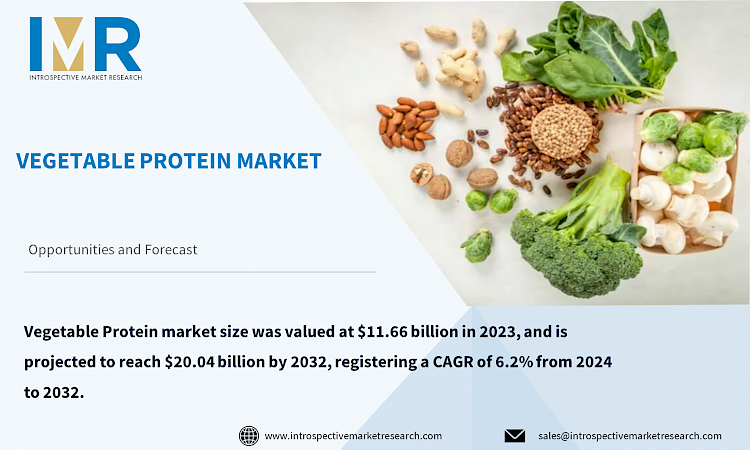Vegetable Protein Market
According to a new report published by Introspective Market Research, titled, ?Vegetable Protein Market by Source, Type, Form, Application, End-user: Global Opportunity Analysis and Industry Forecast, 2024?2032,?
the global Vegetable Protein market size was valued at $11.66 billion in 2023, and is projected to reach $20.04 billion by 2032, registering a CAGR of 6.2% from 2024 to 2032.
Vegetable protein, derived from plant sources like soy, pea, wheat, and rice, serves as a vital nutritional component for those following vegetarian, vegan, or flexitarian diets. These proteins, rich in essential amino acids, are integral to various food applications, including plant-based meat alternatives, dairy substitutes, and nutrition supplements. The increasing awareness of the health benefits of plant-based diets, such as weight management and heart health, has driven a growing demand for vegetable proteins as alternatives to animal-derived proteins. This shift is bolstered by the recognition of vegetable proteins as environmentally sustainable and ethically sound. The market is experiencing significant innovation, with food companies investing in R&D to improve the taste, texture, and nutritional profile of these products. Technological advancements in extraction and processing are further enhancing their quality and versatility, contributing to the market's growth. As consumer preferences shift towards plant-centric diets, the vegetable protein market is poised for continued expansion, catering to health-conscious individuals globally.
Two key drivers of the vegetable protein market are the rising consumer awareness of health benefits and the increasing environmental concerns. Health-conscious consumers are turning to plant-based diets for their potential benefits in weight management, cardiovascular health, and overall well-being, spurring demand for vegetable proteins as a healthier alternative to animal proteins. Additionally, as environmental sustainability becomes a critical issue, more people are recognizing the lower environmental footprint of plant-based proteins compared to traditional meat production. This growing eco-consciousness is driving both consumers and companies to adopt and promote vegetable proteins as a more sustainable food source.
Opportunities within the vegetable protein market include innovation in product development and expansion into emerging markets. There is significant potential for food companies to develop new and improved vegetable protein products that offer better taste, texture, and nutritional profiles, making them more appealing to a broader audience. Innovations in food technology and processing methods can further enhance the quality and variety of plant-based protein products. Additionally, expanding into emerging markets, where rising disposable incomes and urbanization are leading to increased interest in health and wellness, presents a substantial growth opportunity. These regions, particularly in Asia and Latin America, are poised to become major consumers of vegetable protein products as dietary preferences shift towards more sustainable and health-conscious options.
Global Vegetable Protein Market, Segmentation
The Vegetable Protein market is segmented on the basis of source, type, form, application, end-user, and region.
Type:
Protein concentrates offer a cost-effective solution, catering to a broader consumer base compared to pricier isolates. Their moderate protein content packs a nutritional punch, appealing to health-conscious individuals seeking a good protein boost without breaking the bank. The Concentrates boast a richer blend of nutrients beyond just protein, including fiber, vitamins, and minerals, making them well-rounded dietary additions. Their versatility shines in various applications, excelling in food and beverage formulations, dietary supplements, and even animal feed. This ability to seamlessly integrate into diverse products fuels their widespread adoption and market dominance
Form:
The dry form of vegetable protein involves the removal of moisture content through processes such as drying and dehydration. This form offers several advantages, including longer shelf life, ease of storage, and convenient transportation, making it a preferred choice for manufacturers and consumers alike. The popularity of dry vegetable protein is attributed to its versatility in various food applications. It serves as a crucial ingredient in the formulation of plant-based products such as protein bars, snacks, powdered supplements, and meat alternatives. Dry vegetable protein concentrates and isolates can be easily incorporated into a wide range of recipes, providing an efficient way to boost the protein content of food products. As consumers increasingly seek convenient and shelf-stable protein sources, the Dry segment in the Vegetable Protein market is composed for sustained growth, reflecting the demand for practical and adaptable plant-based protein solutions.
Region:
Asia Pacific is optimistic to dominate the Vegetable Protein market over the forecast period, driven by a confluence of factors that emphasize the region's economic, demographic, and dietary dynamics. The increasing population, attached to rising health consciousness and awareness of sustainable food choices, has led to an increased adoption of plant-based diets across countries in the Asia Pacific. The traditional diets in many Asian cultures often incorporate plant-based protein sources, aligning with the global trend toward healthier and more sustainable eating habits.
The region's economic growth has resulted in an expanding middle-class population with higher disposable incomes, enabling consumers to invest in premium and health-conscious food choices. As a response to this demand, both local and international food manufacturers are introducing a diverse range of vegetable protein products, contributing to the market's robust growth in the Asia Pacific. The region's dominance in the Vegetable Protein market reflects a combination of cultural, economic, and health-driven factors that position it as a key player in the evolving landscape of plant-based nutrition.
Key Players in the Global Vegetable Protein Market
Some of the leading Vegetable Protein market players are
- DuPont Industrial Biosciences (USA)
- Ingredion Incorporated (USA)
- Archer Daniels Midland (ADM) (USA)
- Bunge Limited (USA)
- Cargill, Inc.(USA)
- Conagra Brands, Inc. (USA)
- Beyond Meat, Inc. (USA)
- Impossible Foods Inc. (USA)
- Hain Celestial Group, Inc. (USA)
- Mondelez International, Inc. (USA)
- Blue Diamond Growers (USA)
- SunFood Superfoods Inc. (USA)
- Axiom Foods, Inc. (USA)
- Amy's Kitchen Inc. (USA)
- Evonik Industries (Germany)
- Kerry Group plc (Ireland)
- Roquette Fr?res (France)
- Aarkay Foods & Proteins Ltd. (India)
- Burcon NutraScience Inc. (Canada)
- Olam International Ltd. (Singapore), AND Other Major Players.
Key Industry Developments:
- In December 2022, ADM, a prominent global nutrition leader, revealed plans to invest around $300 million for a substantial expansion of its alternative protein production in Decatur, Illinois. This strategic move aligns with the company's commitment to meeting the escalating demand for alternative protein sources. As part of this expansion initiative, ADM will establish a cutting-edge Protein Innovation Center in Decatur, further augmenting its capabilities in the alternative protein sector.
Key Findings of the Study
- The global vegetable protein market was valued at $11.66 billion in 2023 and is projected to reach $20.04 billion by 2032, growing at a CAGR of 6.2% from 2024 to 2032.
- Rising consumer awareness about the health benefits of plant-based diets, such as improved weight management and cardiovascular health, is a major driver of the market's growth.
- Environmental sustainability and ethical considerations are boosting the demand for vegetable proteins, with consumers and companies increasingly favoring plant-based proteins for their lower environmental impact compared to animal-derived proteins.






